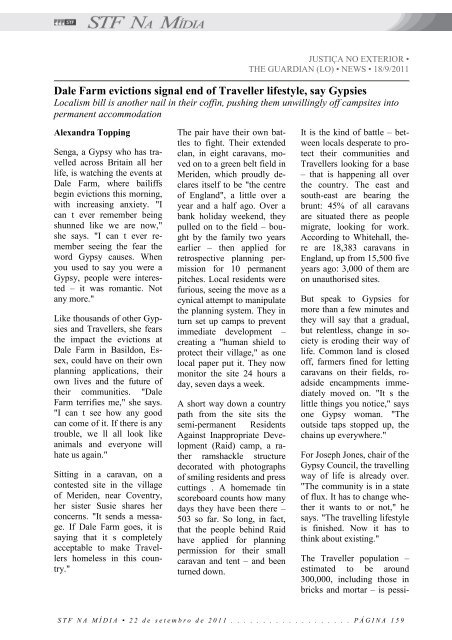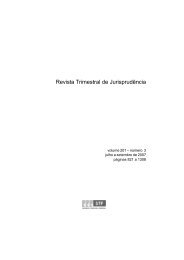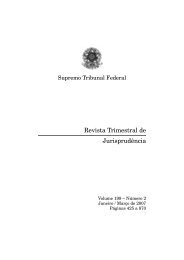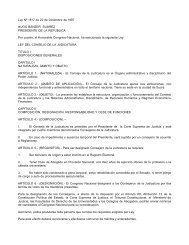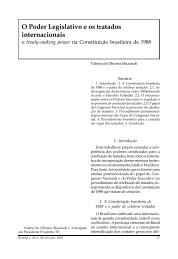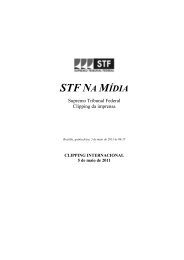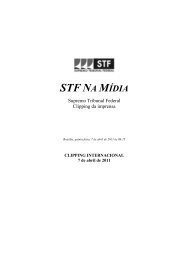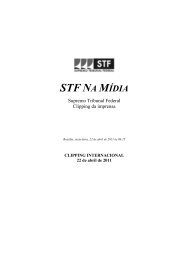STF NA MÍDIA
STF NA MÍDIA
STF NA MÍDIA
Create successful ePaper yourself
Turn your PDF publications into a flip-book with our unique Google optimized e-Paper software.
JUSTIÇA NO EXTERIOR •<br />
THE GUARDIAN (LO) • NEWS • 18/9/2011<br />
Dale Farm evictions signal end of Traveller lifestyle, say Gypsies<br />
Localism bill is another nail in their coffin, pushing them unwillingly off campsites into<br />
permanent accommodation<br />
Alexandra Topping<br />
Senga, a Gypsy who has travelled<br />
across Britain all her<br />
life, is watching the events at<br />
Dale Farm, where bailiffs<br />
begin evictions this morning,<br />
with increasing anxiety. "I<br />
can t ever remember being<br />
shunned like we are now,"<br />
she says. "I can t ever remember<br />
seeing the fear the<br />
word Gypsy causes. When<br />
you used to say you were a<br />
Gypsy, people were interested<br />
– it was romantic. Not<br />
any more."<br />
Like thousands of other Gypsies<br />
and Travellers, she fears<br />
the impact the evictions at<br />
Dale Farm in Basildon, Essex,<br />
could have on their own<br />
planning applications, their<br />
own lives and the future of<br />
their communities. "Dale<br />
Farm terrifies me," she says.<br />
"I can t see how any good<br />
can come of it. If there is any<br />
trouble, we ll all look like<br />
animals and everyone will<br />
hate us again."<br />
Sitting in a caravan, on a<br />
contested site in the village<br />
of Meriden, near Coventry,<br />
her sister Susie shares her<br />
concerns. "It sends a message.<br />
If Dale Farm goes, it is<br />
saying that it s completely<br />
acceptable to make Travellers<br />
homeless in this country."<br />
The pair have their own battles<br />
to fight. Their extended<br />
clan, in eight caravans, moved<br />
on to a green belt field in<br />
Meriden, which proudly declares<br />
itself to be "the centre<br />
of England", a little over a<br />
year and a half ago. Over a<br />
bank holiday weekend, they<br />
pulled on to the field – bought<br />
by the family two years<br />
earlier – then applied for<br />
retrospective planning permission<br />
for 10 permanent<br />
pitches. Local residents were<br />
furious, seeing the move as a<br />
cynical attempt to manipulate<br />
the planning system. They in<br />
turn set up camps to prevent<br />
immediate development –<br />
creating a "human shield to<br />
protect their village," as one<br />
local paper put it. They now<br />
monitor the site 24 hours a<br />
day, seven days a week.<br />
A short way down a country<br />
path from the site sits the<br />
semi-permanent Residents<br />
Against Inappropriate Development<br />
(Raid) camp, a rather<br />
ramshackle structure<br />
decorated with photographs<br />
of smiling residents and press<br />
cuttings . A homemade tin<br />
scoreboard counts how many<br />
days they have been there –<br />
503 so far. So long, in fact,<br />
that the people behind Raid<br />
have applied for planning<br />
permission for their small<br />
caravan and tent – and been<br />
turned down.<br />
It is the kind of battle – between<br />
locals desperate to protect<br />
their communities and<br />
Travellers looking for a base<br />
– that is happening all over<br />
the country. The east and<br />
south-east are bearing the<br />
brunt: 45% of all caravans<br />
are situated there as people<br />
migrate, looking for work.<br />
According to Whitehall, there<br />
are 18,383 caravans in<br />
England, up from 15,500 five<br />
years ago: 3,000 of them are<br />
on unauthorised sites.<br />
But speak to Gypsies for<br />
more than a few minutes and<br />
they will say that a gradual,<br />
but relentless, change in society<br />
is eroding their way of<br />
life. Common land is closed<br />
off, farmers fined for letting<br />
caravans on their fields, roadside<br />
encampments immediately<br />
moved on. "It s the<br />
little things you notice," says<br />
one Gypsy woman. "The<br />
outside taps stopped up, the<br />
chains up everywhere."<br />
For Joseph Jones, chair of the<br />
Gypsy Council, the travelling<br />
way of life is already over.<br />
"The community is in a state<br />
of flux. It has to change whether<br />
it wants to or not," he<br />
says. "The travelling lifestyle<br />
is finished. Now it has to<br />
think about existing."<br />
The Traveller population –<br />
estimated to be around<br />
300,000, including those in<br />
bricks and mortar – is pessi-<br />
S T F N A M Í D I A • 2 2 d e s e t e m b r o d e 2 0 1 1 . . . . . . . . . . . . . . . . . . . P Á G I N A 1 5 9


